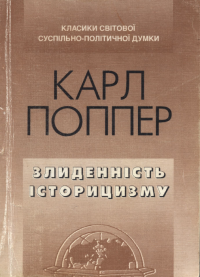The Poverty of Historicism (Trans. from Eng. by Vasyl Lisovyi): Kyiv, Abrys, 1994, 192 p.
Synopsis
The book by Karl Popper, a world-renowned scholar in the field of philosophy of history, provides a reasoned critique of the understanding of history as a process subject to the laws of necessity. The simplicity of the presentation of rather complex problems and the ease of the style make this book accessible not only to scholars but also to anyone interested in the methodology of the social sciences.
CONTENTS
V. Lisovyi – Karl Raymond Popper and his work «The Poverty of Historicism»
A historical note
Preface
Introduction
I. The Anti-Naturalistic Doctrines of Historicism
1. Generalization
2. Experiment
3. Novelty
4. Complexity
5. Inexactitude of Prediction
6. Objectivity and Valuation
7. Holism
8. Intuitive Understanding
9. Quantitative methods
10. Essentialism versus Nominalism
II. The Pro-Naturalistic Doctrines of Historicism
11. Comparison with Astronomy. Long-Term Forecasts and Large-Scale Forecasts
12. The Observational Basis
13. Social Dynamics
14. Historical Laws
15. Historical Prophecy versus Social Engineering
16. The Theory of Historical Development
17. Interpreting versus Planning Social Change
18. Conclusion of the Analysis
III. Criticism of the Anti-Naturalistic Doctrines
19. Practical Aims of this Criticism
20. The Technological Approach to Sociology
21. Piecemeal versus Utopian Engineering
22. The Unholy Alliance with Utopianism
23. Criticism of Holism
24. The Holistic Theory of Social Experiments
25. The Variability of Experimental Conditions
26. Are Generalizations Confined to Periods?
IV. Criticism of the Pro-Naturalistic Doctrines
27. Is there a Law of Evolution? Laws and Trends
28. The Method of Reduction. Causal Explanation. Prediction and Prophecy
29. The Unity of Method
30. Theoretical and Historical Sciences
31. Situational Logic in History. Historical Interpretation
32. The Institutional Theory of Progress
33. Conclusion. The Emotional Appeal of Historicism
Name index
Downloads




